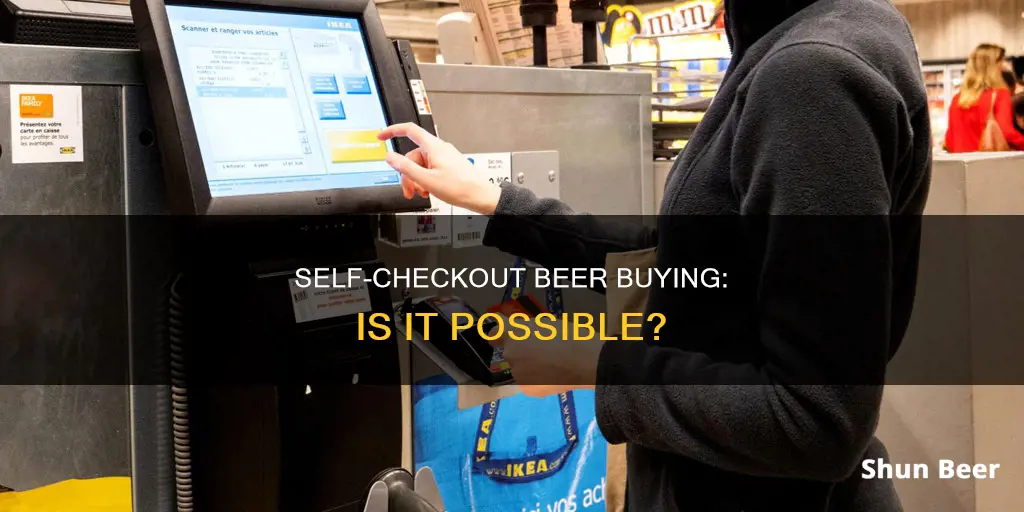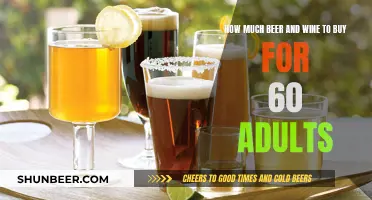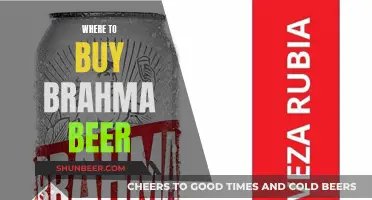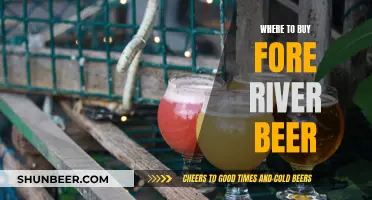
Buying alcohol through self-checkout has been a topic of discussion in recent years, with studies showing that it has become an important source of alcohol for underage customers. In a study conducted in the Netherlands, eight 17-year-old minors were able to buy a significant volume of alcohol-containing beverages through self-checkout lanes in supermarkets. This has raised concerns about the effectiveness of age verification policies and the potential for underage drinking. While some stores have implemented ID checks and employee supervision at self-checkout lanes, the compliance rate varies, and minors have been able to develop strategies to circumvent the system. This has led to discussions about the potential benefits of prohibiting the sale of alcohol through self-checkout lanes altogether.
| Characteristics | Values |
|---|---|
| Can you buy beer through self-checkout? | Yes, but an employee will need to check your ID and unlock the machine before the purchase can continue. |
| How does the employee know to come and check your ID? | The machine lights up when there is an alcoholic beverage in your basket. |
| What happens if the employee doesn't come to check your ID? | The purchase can continue after 10-15 seconds. |
What You'll Learn
- Self-checkout machines will flag alcohol purchases and lock up until an employee checks your ID
- In-person staff will check your ID when buying alcohol through self-checkout
- Self-checkouts are a source of alcohol for underage customers
- Self-checkout technology and procedures often fail to comply with legislation aimed at preventing underage alcohol sales
- In some places, the sale of alcohol through self-checkouts is prohibited

Self-checkout machines will flag alcohol purchases and lock up until an employee checks your ID
The implementation of self-checkout machines in supermarkets has raised concerns about the availability of alcohol to underage customers. Studies have shown that self-checkout lanes can be a significant source of alcohol for minors, as they may not always be properly monitored by staff. In some cases, the self-checkout system may fail to flag alcohol purchases or employees may not respond promptly to the alert, allowing underage individuals to purchase alcohol without proper ID verification.
To address this issue, supermarkets have implemented various strategies to enhance age verification at self-checkout lanes. These measures include increasing staff presence near the self-checkout area, improving employee training on ID checking procedures, and implementing technological solutions such as ID readers or remote age verification systems. By taking these proactive steps, supermarkets aim to reduce the risk of underage alcohol sales and ensure compliance with legal age restrictions.
It is important to note that the specific procedures for purchasing alcohol through self-checkout may vary depending on the store and local regulations. While self-checkout machines are designed to flag alcohol purchases and require ID verification, the effectiveness of these measures relies on proper implementation and staff diligence. As such, ongoing efforts are necessary to prevent underage access to alcohol and promote responsible retail practices.
Buying Beer on Sundays in Mississippi: What's the Deal?
You may want to see also

In-person staff will check your ID when buying alcohol through self-checkout
When buying alcohol through self-checkout, in-person staff will check your ID. The machine will light up when an alcoholic beverage is scanned, and the screen will lock up until an employee comes over to verify your age. This is a legal requirement in many countries, and vendors can get into serious trouble if they do not comply.
In some cases, the employee may choose to clear you from their station if you look old enough. However, if there is any doubt, they are required to ask for identification. This usually means that they will need to see a valid driver's license, passport, or another form of government-issued ID with your date of birth on it. The vendor will then validate your age and clear the system for you to continue with the purchase.
It is important to note that the specific procedures and technologies used for age verification may vary depending on the country and the retailer. For example, some stores may have ID readers or remote age verification systems in place, while others may rely solely on visual inspection of the ID by the employee.
While self-checkout lanes can provide a convenient way to purchase alcohol, it is crucial that retailers and their employees strictly adhere to age verification procedures to prevent underage sales. This includes ensuring that there are enough staff available to promptly check customers' IDs when needed.
Buying Beer in Connecticut on Thanksgiving: What's the Deal?
You may want to see also

Self-checkouts are a source of alcohol for underage customers
Self-checkouts have been identified as a source of alcohol for underage customers. In a study conducted in the Netherlands, eight 17-year-olds were able to buy alcohol through self-checkout lanes in supermarkets. The study found that the current self-checkout technology and procedures in Dutch supermarkets fail to comply with the legislation aimed at preventing underage alcohol sales. When age-restricted alcohol products are scanned, the system should warn both the customer and staff that age verification is required. However, in many cases, employees did not show up to verify the customer's age, allowing minors to purchase alcohol without an ID check.
Similar findings have been reported in the United States, where self-checkout lanes have been identified as a potential source of alcoholic beverages for minors. A study in California found that 8.8% of purchase observations resulted in a failure to ask for identification, indicating that self-checkout options can facilitate alcohol sales to underage customers.
The issue of underage alcohol sales through self-checkout has also been highlighted on social media platforms like TikTok and Reddit. Users have shared techniques for bypassing age verification, such as scanning non-alcoholic products and then swapping them with alcoholic beverages of similar size and appearance. These posts have sparked concerns about the ease of access to alcohol for minors and the potential impact on their health and well-being.
To address this problem, some states in the US, like California, have prohibited the sale of alcohol through self-checkout lanes. Additionally, retailers have implemented measures to ensure compliance with age-limit legislation. For example, some supermarkets require vendors to ask for ID from buyers who appear younger than 25 years old. However, vendor compliance with these policies varies, and underage customers may still find ways to circumvent the rules.
The availability of alcohol through self-checkout lanes poses a significant risk to adolescents, as commercial alcohol availability is one of the most influential predictors of its use by young people. Therefore, addressing this issue is crucial to protect minors from the negative consequences of alcohol consumption.
Best Places to Buy Beer Steins: A Comprehensive Guide
You may want to see also

Self-checkout technology and procedures often fail to comply with legislation aimed at preventing underage alcohol sales
The bill was a response to the growing number of self-checkout lanes in supermarkets, which have become a significant source of alcohol for underage customers. A study by the Center for Alcohol and Drug Studies at San Diego State University found that automatic scanners failed to flag alcohol purchases by people aged 21 to 23 about 9% of the time. While most of these failures were rectified by store employees, the study highlights the potential for minors to purchase alcohol without proper age verification.
In practice, when alcohol is scanned at a self-checkout, the system typically recognises age-restricted products and alerts staff to validate the customer's ID. However, there have been reports of the system being cleared automatically after 10 to 15 seconds if no staff member intervenes. This creates a window of opportunity for minors to make alcohol purchases without age verification, especially in stores with limited staff.
Additionally, when staff are present to validate IDs, they may not always do so consistently. A study in the Netherlands found that vendors asked for ID in only 79% of interventions, and the compliance level was just 30.6%. This indicates that even when the technology functions correctly, age verification can still fail due to human error or negligence.
To address these issues, several states have introduced laws that incentivise retailers to use electronic scanners to verify customer age and ID legitimacy. These laws provide an affirmative defence in prosecutions for sales to minors if the retailer can show that the scanner was used properly. However, the effectiveness of these laws may be limited if retailers do not consistently use electronic scanners or if minors use false or borrowed IDs.
Overall, while self-checkout technology has improved to detect age-restricted products, the effectiveness of these systems relies heavily on proper staff training and intervention. Without consistent staff involvement and strict ID verification procedures, self-checkout lanes may continue to provide opportunities for underage individuals to purchase alcohol, undermining the legislation aimed at preventing underage sales.
Minors and Non-Alcoholic Beer: Legal Purchase?
You may want to see also

In some places, the sale of alcohol through self-checkouts is prohibited
In California, for example, the legislation prohibits the sale of alcohol through self-checkouts as it is believed that it facilitates the purchase of alcoholic beverages by minors, allows intoxicated customers to purchase more alcohol, and increases the risk of theft.
To prevent the sale of alcohol to minors, some countries have legal age limits that forbid the sale of alcohol to anyone under the age of 18 or 21. For example, the Dutch Licensing and Catering Act prohibits alcohol sales to anyone younger than 18 years old, and vendors are required to verify a customer's age. Similarly, the Tobacco 21 Legislation in the United States changed the legal age for purchasing tobacco and tobacco-related products to 21.
To address the issue of underage alcohol sales through self-checkouts, some countries have implemented age verification systems such as ID readers and remote age verification. However, these systems have their limitations, such as low compliance rates and the possibility of using fake IDs.
Overall, the sale of alcohol through self-checkouts is a complex issue that requires a balance between preventing underage access and providing convenient purchasing options for adults.
Best Places to Buy Leinenkugel's Summer Shandy
You may want to see also
Frequently asked questions
Yes, you can buy beer through self-checkout. However, an employee will have to come over and check your ID before the purchase can be processed.
The self-checkout machine lights up when there's an alcoholic beverage in your basket.
If you don't have an ID, the employee will not be able to validate your age and you won't be able to purchase the beer.
No, it is illegal to sell alcohol to someone who cannot prove they are of legal drinking age.
Using a fake ID is illegal and can result in serious consequences. It is also unlikely to work as employees are trained to spot fake IDs.







